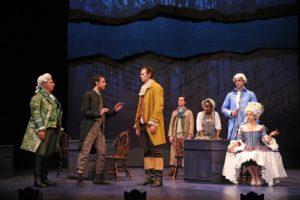
Ford’s Theatre’s historical significance as the place Abraham Lincoln was assassinated lends weight to the performance of “Jefferson’s Garden,” a show that explores the tensions between the ideals of the Founding Fathers and the difficult realities of freedom in America.
British playwright Timberlake Wertenbaker’s scenes illustrate important historical markers, making her organic theater production equal parts informative and entertaining. Just as history books draw on specific moments in history to open a door to live interpretation, so does “Jefferson’s Garden.”
The show, directed by Nataki Garrett, is set during the American Revolution. In the two-and-a-half hour production, this specific moment in history is used to explore the boundaries between politics and freedom.
The two main characters of “Jefferson’s Garden” include Christian, played by Christopher Dinolfo, a Quaker pacifist who leaves his family to support the American Revolution, and Susannah, played by Felicia Curry, an enslaved woman in Virginia who joins the redcoats to gain her own freedom. Thomas Jefferson’s role, played by Michael Halling, is that of a man torn between his lofty words and compromise for the sake of the country.
Playwright Timberlake Wertenbaker wrote a diversity of voices into “Jefferson’s Garden,” and throughout the production, actors Christopher Bloch, Michael Kevin Darnall, Kimberly Gilbert, Michael Halling, Thomas Keegan, Kathryn Tkel and Maggie Wilder occupy a variety of roles.
The chorus brings the audience into the performance with its interjections and subtle comments about the present day. Captivating young and old audience members alike, Wertenbaker uses the chorus to shed light on certain scenes and quotations within her production. Chorus members call upon the audience to be deeply perspective, blind to color and open-minded.
Wertenbaker’s play offers a contemporary perspective on American history. It confronts the tensions between our Founding Fathers’ ideals and the realities of freedom in America when considering slavery. The sociopolitical context of 18th-century America creates an ethical dilemma for Jefferson, patriots and politicians involved in the drafting of the Constitution. “Jefferson’s Garden” speaks to the foundational problems embedded in our country’s tumultuous history, with issues like race, religion, politics and gender occupying the forefront of the performance.
James Madison, Patrick Henry and Sally and James Hemmings are a few others forced to address difficult compromises made at the nation’s founding. Jefferson must deal with his slave ownership and role in Virginia. Susannah, enslaved, must choose between love and her freedom. Wertenbaker uses her artistic medium as a platform for dealing with issues still prevalent today. The consequences of America’s history resound in the 21st century.
“Jefferson’s Garden” is must-see historical fiction. In the current political climate, studying American history is necessary to understanding where the corruption of freedom originated.
Playwright Wertenbaker said in an interview with Ford’s Theatre, “It seemed to me that the American revolutionaries fought for freedom and spoke of hope, but there was a deep contradiction at the heart of the rhetoric.”
She acknowledged the patriotism of their actions but did not shy away from exposing the revolutionaries for their skewed perception of equality.
“The fault lines [of corruption] were laid,” Wertenbaker said. “These are the fault lines we suffer from today.”
“Jefferson’s Garden” has performances Jan. 19 to Feb. 8, 2018 at Ford’s Theatre. Tickets are on sale for $22-$64 and available at www.fords.org.



















